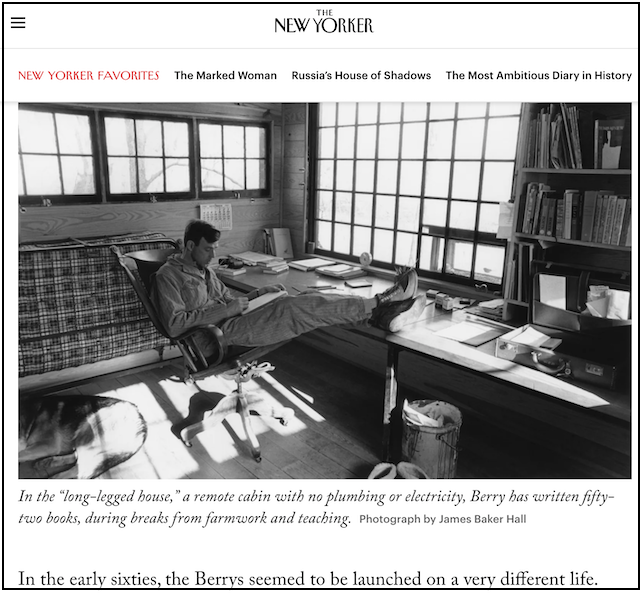
In my previous essay, I wrote about how novelist Jack Carr rented a rustic cabin to help focus his attention on completing his latest James Reece thriller. This talk of writing retreats got me thinking again about what’s arguably my favorite example from this particular genre of aspirational day dreaming: Wendell Berry’s “camp” on the Kentucky River.
In February, Dorothy Wickenden, whose father Dan Wickenden was Berry’s original editor at Harcourt Brace, featured Berry’s camp in a lengthy New Yorker profile of the now 87-year old writer, farmer, and activist. Berry brought Wickenden to a twelve-by-sixteen foot one-room structure, raised on concrete pilings high on the sloped bank of the river, only on the condition that she not reveal its exact location.
In the summer of 1963, Berry, all of twenty-nine, and just a few years into a professorship at New York University, built the current cabin on the same site where his great-great-great grandfather, Ben Perry, one of the first settlers in the valley, had long ago erected a log house. Berry remembered the location from his childhood. As Wickenden explains, Berry returned that summer to build an escape where he could “write, read, and contemplate the legacies of his forebears, and what inheritance he might leave behind.”
What struck me as I returned to this story were the unremarked implications of its timing. Berry supposedly built the cabin in the summer of 1963, but didn’t announce his resignation from NYU and move to Kentucky until 1964. Though I can’t confirm these details, I like to imagine Berry returning to New York from his summer retreat, with the attraction of the deep contemplation available on the quiet shores of the Kentucky River gnawing at his attention, stirring something within — until, finally, he cracked, and decided it was time to move home.
Regardless of the details of Berry’s motivation, it’s hard, in hindsight to question the decision, as he ended up writing fifty-two books in that humble room, and becoming one of the twentieth century’s most influential voices on sustainability and rural living.
Sometimes we retreat to the proverbial cabin to support deep work already under way. Other times, we build the cabin first, and then let its charms convince us to get started.

I had heard of Wendell Berry but did not know much about him. This blog post pointed out Berry’s Deep Work and how prolific he was. This was interesting, but I also read The New Yorker article as well and found it fascinating. Thank you for the introduction.
Sounds productive but also super lonely. I love a good cabin — but I also think romanticizing these “escapes to the forest” is over-indexing on one dimension of a deep life. Notice you only mention his productive output and intellectual stature when suggesting the move was a success. That’s not the endgame of a deep life.
That’s an interesting point you bring up. I have the impression that living a deep life does require a bit of sacrificing your social life. Personally I’m attracted to the idea on working on something so fulfilling it takes up your day but I wouldn’t shut out my close friends and family for large periods of time over this. I guess the endgame of a deep life will depend on what each person is looking for
There’s a difference between loneliness and solitude (as Henri Nouwen pointed out years ago). I do not think Mr. Berry is lonely. But he has created essays, fiction and poetry of, yes, real depth for decades, rooted in his periods of retreat into solitude.
I think anyone who aspires to the deep life needs “a room of one’s own” to quote the relevant book by Virginia Woolf. Denial of the space and freedom to reflect and contemplate on life, or to create, is a form of poverty, most often suffered by women and the poor. Our tech saturated life (a Digital Minimalism teaches) has made it so even those with the means to create a safe haven do not even know how desperately they also need it. Thanks Cal for your vitally important messages on this topic. I hope people listen.
Have you read Donald Hall’s, Life Work? Sooo good!